- Home
- Sam Christer
The Stonehenge Legacy Page 2
The Stonehenge Legacy Read online
Page 2
Childhood memories tumble on him like a row of falling dominoes. A big Christmas tree. A melting snowman on the front patch of lawn. A pre-school Gideon coming downstairs in pyjamas to open presents. His father playing with him while his mother cooked enough food to feed a village. He remembers them kissing under the mistletoe while he hugged their legs until they had to pick him up and include him. Then comes the thump. As a six-year-old, enduring the pain of his mother’s death. The silence of the graveyard. The emptiness of their home. The change in his father. The loneliness of boarding school.
He has much to think about on the journey south to Wiltshire, the county where his mother had been born, the place she’d always lovingly called ‘Thomas Hardy Land’.
4
WILTSHIRE
Few know of its existence. A secret vault of cold stone, scaled to epic proportions by prehistoric architects. A place unvisited by the uninitiated.
The Sanctuary of the Followers is an unseen wonder. It is the size of a cathedral and yet a mere bump in the turf on the fields above, almost invisible to the human eye. Below ground, it’s the jewel of an ancient civilisation, the product of a people whose brilliance still baffles the greatest brains of modern times.
Fashioned three thousand years before Christ, the place is an anachronism, a vast temple as out-of-time, breathtaking and impossible as the Great Pyramid of Giza.
Buried in its subterranean tombs are the architects of both Stonehenge and the Sanctuary. Their bones rest in the midst of more than two million blocks of stone, quarried from the same sources. Just as the Giza monument was a near-perfect pyramid, the Sanctuary is a near-perfect semi-sphere, a dome arcing over a circular floor, a cold moon sliced in half.
Now footsteps resound through the Descending Passage as though rain is falling into the cavernous chambers. In the candlelight of the Lesser Hall, the Inner Circle gathers. There are five of them, representatives of the giant trilithons sited inside the circle of Stonehenge. All are cloaked and hooded: a sign of respect for generations past, those who gave their lives to create this sacred place.
Upon initiation, Followers become known by the name of a constellation that shares the initial letter of their own first name. This shroud of secrecy is another age-old tradition, an echo of an epoch when the whole world was guided by stars.
Draco is tall and broad and exudes power. He is the most senior, the Keeper of the Inner Circle. His name comes from the Latin for ‘dragon’ and the constellation that almost three thousand years ago cradled the northern world’s all-important pole star.
‘What is being said?’ He gives a flash of perfect teeth beneath his hood. ‘What are they doing?’
The ‘they’ in question are the police, the Wiltshire constabulary, the oldest county police force in the country.
Grus, a thickset man in his early fifties, pounces. ‘He shot himself.’
Musca paces thoughtfully, candles casting spectral shadows on the stone walls behind. Although the youngest of them all, his large physical presence dominates the chamber. ‘I never expected him to do this. He was as devoted as any of us.’
‘He was a coward,’ snaps Draco. ‘He knew what we expected of him.’
Grus ignores the outburst. ‘It presents us with certain problems.’
Draco steps closer to him. ‘I read the signs as well as you. We have time enough to ride this storm before the holy nexus.’
‘There was a letter,’ adds Grus. ‘Aquila knows someone working on the investigation and a suicide note was left for his son.’
‘Son?’ Draco casts his mind back and a vague memory surfaces. Nathaniel with a child, a skinny youth with a mop of black hair. ‘I forgot he had a son. Became a teacher at Oxford?’
‘Cambridge. Now he’ll be coming home.’ Grus lays out the implication. ‘Back to his father’s home. And who knows what he might find in there.’
Draco creases his brow and looks fixedly to Musca. ‘Do what must be done. We all thought well of our brother. In life he was our greatest of allies. We must ensure that in death he does not turn out to be our worst of enemies.’
5
STONEHENGE
An evening mist swirls around the base of the stones, a meteorological sleight of hand creating an archipelago in a sea of clouds. To motorists zipping past on the nearby trunk roads it’s a scenic bonus but to the Followers it is much more.
This is twilight. L’heure bleue. A precious, twice-a-day time between dawn and sunrise, sunset and dusk. When light and dark are in balance and the spirits of the hidden worlds find a fragile harmony.
The Henge Master understands. He knows that nautical twilight comes first, as the sun sinks between six and twelve degrees below the horizon and gives sailors the first reliable readings of the stars. Astronomical twilight follows, as the sun slides from twelve to eighteen degrees below the horizon.
Degrees. Geometry. The position of the sun. A sacred triangle mastered by men like him from century to century. Stonehenge wouldn’t be here without them. Its location is not accidental. Divined by the greatest of ancient augers and archaeoastronomers, its siting was planned by the most advanced of minds. Such was the precision of its build, the circle took more than half a millennium to complete.
And now, more than four millennia later, the Followers lavish upon the stones a similar rapt attention to detail.
The Henge Master assumes his position at exactly the moment that nautical twilight enters astronomical twilight. He stands as still as the bluestone soldiers circled around him, guarding, protecting.
He is alone.
Like an ancient haruspex, he waits patiently for the gods.
And soon, in a soft rustle of voices, they speak. He absorbs their wisdom and knows now what to do. He will worry less about the professor’s suicide and more about the son. He will check that the sacrifice was given a proper burial – it would be disastrous if the remains were to be unearthed. Above all, he will ensure that the second stage of the renewal is completed.
The ceremony must be finished.
The milky vapour rises around his legs. In the wondrous half-light the sarsens come alive. A trick of the eye? A trompe l’œil? He doesn’t think so. The new moon is barely visible to the uneducated but to an archaeoastronomer like him it is a beacon in the cosmos. Across the vaults of heaven, orbital maps arrange themselves, celestial cycles spring into being and with every atom of his body he senses completion of the sun’s shift from Beltane to the solstice.
Seven days to solstitium – the moment the sun stands still. And all attention will be on the dawn. When it really should be on the dusk that will follow.
Five full days will pass after midnight on the solstice, then in the fertile evening twilight of that mystical evening will come the first full moon following solstitium. The time of renewal. When he must return to the Sacreds and complete what he has begun.
The sky has darkened now. The Master looks for Polaris, the North Star, the Lodestar, the brightest light of Ursae Minoris. The closest blink of godliness to the celestial pole. His eyes fall down the black curtain of the sky to the prehistoric earth, to the Slaughter Stone, and he shudders as he hears the command of the Sacreds.
The gods will not tolerate failure.
6
WILTSHIRE POLICE HQ, DEVIZES
DI Megan Baker wants to forget this particular day. And it’s still a long way from over. The stick-thin thirty-one-year-old has a sick child at home, no husband to help since she kicked him out, and an arsy DCI who has landed her with a messy suicide. Now she must stay late to see the grieving son, face to face. That, and the combination of unpaid bills cluttering her handbag, is enough to start her smoking again. But she doesn’t.
Her parents have said they’ll have Sammy again, they always do – and it’s ‘never a problem’, unless you count the patronising lecture and the scalding looks when she collects her poorly four-year-old daughter several hours later than promised.
But she won’t give up. Be
ing police is what she always wanted. What – despite a failed marriage – she still wants.
A shot of coffee and several sticks of gum take away the craving for nicotine. Her mobile rings and she looks at the caller display. CB – short for Cheating Bastard. She couldn’t bring herself to enter her ex-husband’s real name. Cheating Bastard seemed more appropriate. He is a uniformed inspector in another local division but their paths still cross. Too often. At work and during painful access visits.
CB doesn’t want agreed visits. Oh no. That would cramp his shag-everything-with-a-pulse lifestyle. He expects to turn up whenever he wants to see Sammy. And that’s just not fair. To her daughter or to her.
The urge to throw the ringing mobile at the wall is almost irresistible. She snatches it off her desk a beat before it trips to voicemail. ‘Yes?’ she snaps.
CB also has no time for pleasantries. ‘Why didn’t you tell me Sammy is sick?’
‘She’s got a fever, that’s all. She’ll be fine.’
‘You a doctor now?’
‘You a parent now?’
He emits a laboured sigh. ‘Meg, I’m concerned about my daughter. You’d shout at me if I didn’t ring, now you’re shouting because I have.’
She counts to ten and spits out his name, ‘Adam, Sammy’s fine. Kids pick up bugs at playschool all the time. Her temperature’s high, she was a little sick last night, that’s all.’
‘It’s not measles or one of those things?’
‘No.’ Megan suddenly doubts herself. ‘I don’t think so. Mum’s with her, there is nothing to worry about.’
‘You should be with her. When she’s sick a little girl wants her mum not her grandma.’
‘Go to hell, Adam.’ She hangs up and feels her heart pounding. He always does that to her. Winds her up. Brings her to snapping point.
The desk phone jangles and she nearly jumps out of her skin. It’s reception. Gideon Chase is downstairs. She tells them she is on her way and takes a final slug of the now-cold coffee. Talking to the family of the deceased is never easy.
Reception is empty except for a tall, dark-haired man with shock etched on his pale face. She takes a long breath as she approaches. ‘I’m Detective Inspector Baker. Megan Baker.’ She offers a hand and instantly notices the well-worn blue plaster on her index finger is in danger of coming off.
‘Gideon Chase,’ he murmurs, careful not to dislodge the dubious Band-Aid. ‘Sorry I’m late. The traffic.’
She smiles sympathetically. ‘It’s always bad. Thanks for coming so quickly. I know this must be difficult.’ She opens a door with her swipe card. ‘Let’s go through to the back. We can find somewhere quiet to talk.’
7
DEVIZES
To an archaeologist like Gideon Chase, locations and first impressions are of particular importance. A stretch of scorched red Egyptian sand or a dark-green field of English countryside say much about the possible discoveries that lie ahead. The cheap, windowless, wooden door that DI Baker opens and ushers him through does the same.
It’s a dull box, floored in black carpet tiles and walled in shades of scuffed grey. Decor as welcoming as a grave. The only bright thing in the room is the woman DI. Reddish-brown hair, sharply dressed in a russet jersey top and flared black trousers. Gideon perches on an uncomfortable moulded chair and out of curiosity nudges the edge of the table in front of him. It’s bolted to the floor.
Megan Baker is big on first appearances too. With a background in psychology and criminal profiling, she is already appraising the man with dark, Hugh Grant-style hair. He has brown eyes, a full mouth and good cheekbones. His fingernails show no trace of nicotine and have been cut not chewed short. No wedding ring. Many married men don’t wear them but those with strong values do, and he radiates traditionalism. They are epitomised in his blue wool blazer with its leather-patched elbows, an item of dress cultivated in college cloisters rather than council estates. And it doesn’t go with the black cashmere pullover or floppy green shirt. Any woman in his life could have told him that.
She slides an opened envelope over the table. ‘This is the note your father left.’
Gideon looks at it but doesn’t move. It’s spattered with dark marks.
She realises what has caught his attention. ‘I’m sorry. Putting it in a different envelope didn’t seem the right thing to do.’
The right thing to do.
So much of his upbringing has been about the right thing to do. All of it inadequate preparation for the moment you get handed an envelope spattered with the blood of your dead father.
‘Are you all right?’
He fingers a flop of hair from his face and looks up at her. ‘I’m fine.’
They both know he isn’t.
He glances down at the envelope and his own name staring up at him in his father’s copperplate capitals.
GIDEON
For the first time in his life, he is pleased that his father preserved his own eccentric style and used a fountain pen instead of a Biro or felt tip, like the rest of the world seems to do.
Gideon catches himself thinking fondly of the old man and wonders if it’s just a passing moment, if one effect of death is that you suddenly find respect for the things you used to despise. Does it somehow wipe the slate clean and compel you to think only good of those you thought badly of?
He touches the corners of the envelope. Lifts it a little but doesn’t turn it over.
Not yet.
His heart is thumping, like it used to when he and his father argued. He can feel the old man in the letter. He can feel the presence through the parchment. He flips the envelope and pulls it open. As he unfolds the letter, he feels annoyed that the police have read it before him. He understands why: they needed to read it. But they shouldn’t have. It was addressed to him. It was private.
Dearest Gideon,
I hope in death the distance between us is less than in life.
You will find out many things about me now that I am gone. Not all are good and not all are bad. One thing you may not discover is how much I loved you. Every moment of my life I loved you and I was proud of you.
My dearest son, forgive me for how I pushed you away. Looking at you every day was like looking at your mother. You have her eyes. Her smile. Her gentleness and her sweetness. My darling, it was too painful for me to see her in your every breath. I know that is selfish. I know I was wrong to banish you to that school and ignore your pleas to come back home, but please believe me, I feared I would have fallen apart if I had acted otherwise.
My sweet, wonderful child, I am so proud of what you have become and what you have achieved.
Do not compare us. You are a far better man than I ever managed to be and I hope one day you’ll make a far better father too.
You may wonder why I have taken my life. The answer is not a simple one. In life you make choices. In death you are eternally judged on them. Not all judges are good ones. I hope you judge me well and judge me kindly.
Believe me, my death was a noble one and not as pointless and cowardly as it may seem. You have a right to understand of what I speak and a right not to care a jot and to live your life without giving me a second thought.
I hope you choose the latter.
My solicitor will be in touch and you will find that all I have amassed is now yours. Do with it as you will, but I beseech you not to be too charitable.
Gideon, as a child we played games – do you remember? I would devise treasure hunts and you would follow clues I left. In death I leave you clues as well and the answer to a mystery. The greatest treasure of all is to love and be loved – I hope beyond hope that you find it.
It is best that you don’t search for the answers to other mysteries, but I understand you may wish to, and if you do, then you do so with my blessing and my warning to be careful. Trust no one but yourself.
Dearest son, you are a child of the equinox. See beyond the sun of the solstice and focus on the rise of the new moon.
> Things that you first think are bad will prove good. Things you think good will be bad. Life is about balance and judgement.
Forgive me for not being there for you, for not telling you and showing you that I loved you and your mother more than anything in my life.
Your humble, penitent and loving father,
Nathaniel
It’s too much to take in. Too much to understand all at once.
He runs his fingertips gently over the letter. Feels the words ‘Dearest Gideon’. Lets the fingers of both hands rest on the line ‘My sweet, wonderful child, I am so proud of what you have become …’ Finally, almost as though he’s reading Braille, his fingers find the words that moved him the most: ‘Forgive me for not being there for you, for not telling you and showing you that I loved you and your mother more than anything in my life.’
Tears well in his eyes. He feels, impossibly, like his father is reaching out to him. The sensation is that of a prisoner and visitor divided by glass, putting their hands together to say goodbye, touching each other emotionally but not physically. Invisibly divided by life and death. The letter has become a wall of glass, the way his father has chosen to say goodbye.
Megan watches without interrupting and with only occasional glances at her wristwatch to quell the rising guilt about keeping her sickly four-year-old waiting at Grandma’s. She can see the suicide letter is tearing Gideon apart.
‘Would you like some time alone?’
He doesn’t react. Grief is packing his head like cotton wool.
She clears her throat. ‘Mr Chase, it’s getting very late now. Would it be possible to make an appointment to see you tomorrow?’
He climbs out of the numbness. ‘What?’
She smiles understandingly. ‘Tomorrow.’ She nods to the letter. ‘There are some things we would like to ask you about. And I suspect you’ll have questions of your own.’
He has a lot of questions and now they start to spill out. ‘How did my father die?’ He looks pained. ‘I know you said he’d shot himself, but what happened exactly? Where was he? What time …’ His voice breaks with emotion. ‘When did he do it?’

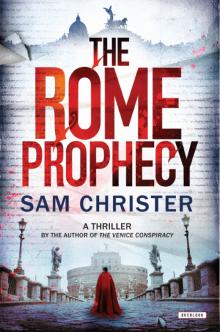 The Rome Prophecy
The Rome Prophecy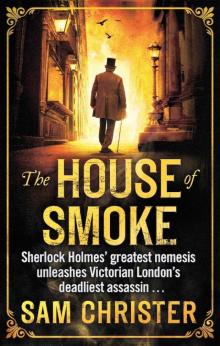 The House Of Smoke
The House Of Smoke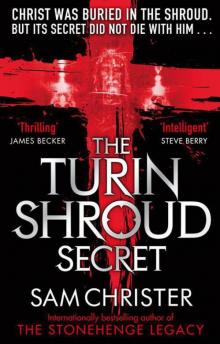 The Turin Shroud Secret
The Turin Shroud Secret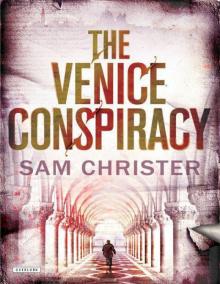 The Venice Conspiracy
The Venice Conspiracy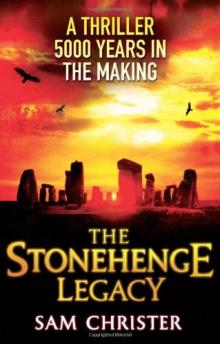 The Stonehenge Legacy
The Stonehenge Legacy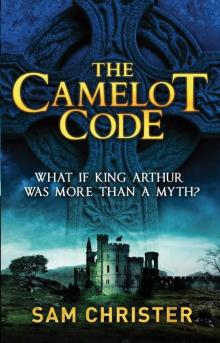 The Camelot Code
The Camelot Code